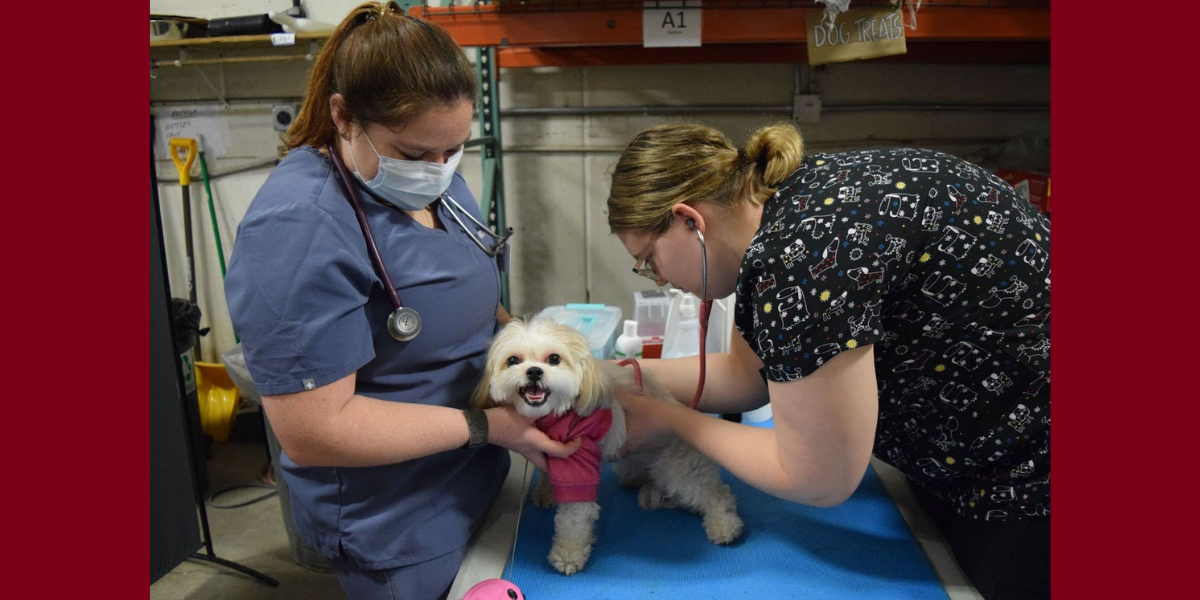Pets are part of the family. What could 'whole family care' look like?
With a new grant, U of M researchers and clinicians are piloting a clinic that will provide care to pets and people under one roof.

With a new grant, U of M researchers and clinicians are piloting a clinic that will provide care to pets and people under one roof.
Two VeTouch students examine a dog during a community clinic.
The University of Minnesota has long offered care for underserved communities across the Twin Cities through two successful student-run free clinics, one focused on human medicine, and one focused on veterinary medicine. Now, through a pioneering pilot program, the College of Veterinary Medicine (CVM) is collaborating with the Medical School and other groups to develop a One Health clinic that will offer these communities care for companion animals and their families in a single setting.
“We’ve seen that our veterinary clients have human health and social support needs that we’re not always able to address in our clinical setting alone, even though we have an integrated social worker,” says Dr. Lauren Bernstein, assistant professor at CVM and one of the principle investigators leading the project. Her peers at the Medical School have similarly seen that the families they treat have needs for their pets that they can’t address.
Supported by a new three-year grant awarded to CVM from Margaret A. Cargill Philanthropies, the team will develop an integrated model that builds on those of the Phillips Neighborhood Clinic (PNC) and VeTouch (Veterinary Treatment Outreach for Urban Community Health) program.
“What we want is to develop a care delivery model that gives people autonomy and empowers people to learn about the types of resources available within their own communities, and that allows them to ask questions they’ve not previously felt empowered to ask either with their physician or their veterinarian,” Bernstein says.
The vision for the clinic entails staffing with veterinary, medical, and mental health professionals, along with U of M students training in those fields, to provide access to culturally safe and trauma-informed care. Crucial to the project’s success is the development of strong partnerships between the University’s educational and clinical services programs and existing community organizations.
“It’s an excellent opportunity for us to integrate the unique aspects of our different areas of expertise,” Bernstein describes. Pulling these models together is a complex undertaking, and the pilot funds will allow the project team to fully outline the organizational, logistical, and regulatory challenges of holding an integrated care clinic.
“This partnership between the PNC and VeTouch is an opportunity to address critical gaps in both human and animal health. It also represents a significant advancement in bringing interprofessional care to the whole family, encompassing the wellbeing of both humans and their pets, and fostering a more comprehensive and inclusive approach to community health,” notes Dr. Brian Sick, professor at the Medical School and collaborator on the project.
At the heart of the project’s concept is the interprofessional education that the clinic will enable.
“Students from different disciplines will be learning alongside each other, and that means learning new ways to tackle clinical problems—and also developing new perspectives about how to address the systemic-level issues that lead to barriers to care in the first place,” says CVM associate professor and co-principle investigator Dr. Julia Ponder.
The ultimate goal is to equip health professionals to enter traditional clinical settings with a more holistic awareness of the health challenges that face families and pets—and a more holistic sense of the possible solutions.
“We want to train future providers in both human and animal medicine to think this way,” Ponder says. “We have a lot to learn from each other.”